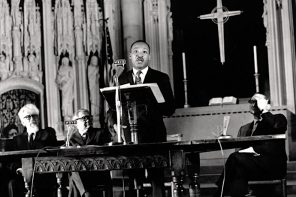Radio host Barry Lynn asked me, during an interview this fall, if I thought Nobel-winner Elie Wiesel’s loss of roughly 15 million dollars to swindler Bernie Madoff might have thwarted his gradual reconciliation with God, turning him back on the road to defiant misotheism.
As I’ve written, Wiesel’s youthful Jewish piety did not survive the Holocaust. This former Hasidic devotee, after witnessing the horrors of Auschwitz, Buchenwald, and Buna, became one of the more outspoken misotheists. Wiesel’s anti-devotional attitude surfaces most clearly in his books Night, The Accident, Gates of the Forest, and especially The Trial of God—texts that brim with their characters’ angry accusations against Yahweh’s cruelty and callousness. Consider a passage from The Trial of God. Here Berish, a Jewish innkeeper who had known more than his fair share of tragedy, builds his case against God in a mock trial that takes place at his inn:
When the whole world is our enemy, when God Himself is on the side of the enemy—when God is the enemy, how can one not be afraid? Admit it: you do fear Him. You neither love nor worship Him. All He evokes in you is fear.
This is more than Job-like lamenting. And certainly Berish never considers submitting to the will of God and praising his name, although he doesn’t stop believing in him. And although Berish is merely a fictional character, one senses that he occupies the moral high ground in this play.
The Trial of God (1979) represents the apex of Wiesel’s misotheistic phase, which had begun in 1944. Afterwards, his anger toward God abated, as he began to stress God’s need for human sympathy. In 1996 he wrote “Surely we have no right to complain, since God, too, knows suffering… We know that God suffers… Isn’t he the father of us all?… How can we fail to pity a father who witnesses the massacre of his children by his other children?”
This change of attitude—a questioning that stops just short of forgiving God—prompted Barry Lynn to wonder whether Wiesel’s financial betrayal at the hands of Madoff may have renewed Wiesel’s suspicions about divine malice. I could not answer that question then (and I still can’t answer it now) because I am not privy to Wiesel’s own deepest beliefs about the matter.
What is perfectly clear from Wiesel’s open statements, though, is that he cannot forgive Madoff, whom he called “one of the greatest scoundrels, thieves, liars, criminals.” There is certainly hatred here. But another comment in this context really caught my attention.
When asked why he fell for Madoff’s too-good-to-be-true scam, Wiesel answered “we thought he was God.” Obviously, the first thing that comes to mind when referring to a powerful, deceptive, and ultimately criminal agency is God. Not Satan. God. Yes, Madoff turned out to be a “false” God, but I wonder if Wiesel’s linking of Madoff with God is not just another way of saying that Madoff merely acted as one would expect God to behave.
God’s love: “from time to time, abusive”
Of course, Jewish protest theology would reject this conclusion; to protest God, even to call God out for his supposed cruelty or indifference, is at bottom nothing else than a yearning to be reconciled with God. A foremost proponent of this view, David Blumenthal, has recently reinforced this point, responding to my ideas about misotheism in an open letter to The Chronicle of Higher Education:
if you love God, you cannot be a misotheist; you have to engage. And, if you engage, with your eyes open to God’s presence among us as we suffer unjustly, you must protest… It is not a humanistic impulse that motivates ‘misotheists’ like myself. It is, rather, a love of God, an acknowledgment of our love for God and God’s love for us, even if that love is, from time to time, abusive.
If to protest God means to engage God—an occasionally abusive God—with the ultimate goal of communicating one’s devotion to God, then God-hatred would have to be a fundamentally different matter compared to hating a human being. After all, we don’t usually seek the approval of people we intensely dislike. Similarly, Wiesel’s fulsome anger against Madoff is not meant to suggest that he wants to “engage” with Madoff in an effort to establish a better relationship with him.
Ultimately, then, the issue comes down to whether it is possible to set aside the fundamental emotional logic that underlies interpersonal relationships when dealing with God. In other words, is it possible to overcome anger against our abuser, just because that abuser is God?
The authors of a recent study about anger toward God (see my last post) would be skeptical. Julie Exline et al. conclude that their “project emphasized parallels between inter-personal anger and anger toward God… Although a perceived relationship with God is clearly not the same as a relationship with a person, this project adds to a growing literature suggesting that many cognitive and emotional processes that focus on God are similar to those that characterize interpersonal relationships”. The study also found that “angry moods were associated with a greater tendency to blame God for the incident”. According to the findings of this social-psychology research, a believer’s misfortune, coupled with the believer’s strong anger toward the person who caused the misfortune, would be a predictor of anger toward God.
This rather erodes the conceptual basis of protest theology. Not only do protest theologians have to overcome the intuitive barrier against linking protest with devotion, but it becomes even harder to separate hatred against a person from hatred against God.
True, hatred against a person or group has different moral implications from hating a deity: one can actually harm people by hating them, whereas one cannot really harm a supernatural entity by hating it. Apart from the effects of the two hatreds, however, it seems to me that similar emotional dynamics pertain in both scenarios.
So, in the final analysis, Wiesel’s crushing disappointment at the hands of Madoff, followed by his intense anger toward the villain, may well have fanned the flames of his misotheism. I, for one, will be keen to see if Wiesel’s next book confirms or disproves this hypothesis.




